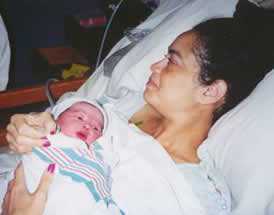
Image courtesy Carol Blocker, Melanie’s mother.
Melanie Stokes was a wonderful woman: kind-hearted, and always smiling, said her mother Carol Blocker.
“She was joyful,” Blocker said. “The only thing she talked about was positive things.”
When Stokes became pregnant, everything in her life seemed to be in place. She was happy and eager to be a mother. It was something she had prayed for, Blocker said.
But shortly after giving birth to her daughter, Sommer Skyy, in 2001,
Stokes’ personality changed. Her usually smiling face turned blank, and she became paranoid, depressed and suicidal.
“She kept saying over and over again what a bad person she was, and that she had to die,” Blocker said. “She said that Sommer didn’t liker her.”
Stokes’ doctors prescribed several combinations of anti-psychotic, anti-anxiety, and anti-depressant medication, Blocker said. Sadly, after being hospitalized three times in seven weeks, Stokes took her life by jumping from the 12th floor of a Chicago building.
Unbeknownst to her doctors, Stokes suffered from the most severe form of postpartum psychiatric illness, postpartum psychosis, a rare mental illness that affects one to two out of every 1,000 deliveries, according to Postpartum Support International. The onset is usually sudden, developing as early as the first 48 to 72 hours after delivery.
In 2010, Blocker and U.S. Rep. Bobby Rush (D-IL) helped to pass “Melanie’s Law,” which allocated $3 million for education and research of postpartum depression. However, none of the money allocated has been spent on research, Blocker said. So far, the only result of the law is that every year new mothers have to be tested for depression.
Fifteen years after Stokes’ death, members of the state’s prenatal care community say there is still more work to be done to prevent postpartum depression. Recently the U.S. Preventive Taskforce issued a recommendation that all adults, especially pregnant and postpartum women, be screened for depression.
However, postpartum depression and psychosis are still a mystery to a lot of doctors, said Dr. Sarah Allen, director of the Postpartum Depression Alliance of Illinois.
“There’s not many doctors trained who specialize in postpartum issues,” Allen said.
Screening can be beneficial, Allen continued, but the larger issue is knowing what to do to fix the problem.
“Most of the people in the medical system that I’ve talked to said it wasn’t even in their medical books,” Blocker said. “So how can you treat something you know nothing about?”
As the number of postpartum depression sufferers increase, access and affordability also become more important. According to research from the Pregnancy Risk Assessment Monitoring System, a databank supported by the Illinois Department of Public Health, from 2007 to 2012 the percentage of postpartum women increased from 8.5 to 10.4 percent. Now, that statistic rests at 20 percent, Allen said.
“More women are coming forward, Blocker said. “They have been suffering in silence.”
Postpartum depression is a serious issue, said state Sen. John G. Mulroe (D-Chicago), chair of the Illinois Pubic Health committee.
“I think postpartum depression is a real issue for women, and the effects could hurt them or possibly even the baby,” Mulroe said. “I think that if we can identify it and help women, that’s a good thing.”
However, gaining access to treatment becomes harder when a mother cannot afford it. The highest population of women affected by postpartum between 2007 and 2012 were ages 24 and under, and had less than 12 years of an education, the Pregnancy Risk Assessment Monitoring System reports. These statistics suggest a possible relationship between economic status and the availability of treatment.
“I don’t want to live in a society where we don’t take care of the poor,” Mulroe said.
Sommer Skyy Stokes, now 15-years-old, is aware of the condition that took her mother. Blocker made sure to give her grand-daughter all of the information she could of the mother she never knew.
“I was proud to call [Melanie] my daughter,” Blocker said, “and that’s why I did so much after I saw what happened to her.”







Be First to Comment